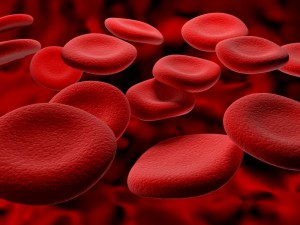 Margy Sennett, PNP, is a pediatric hematology/oncology nurse practitioner. She’s also the coordinator for UVA’s pediatric bleeding and clotting program. She wrote this post for us about a common bleeding disorder called von Willebrand disease.
Margy Sennett, PNP, is a pediatric hematology/oncology nurse practitioner. She’s also the coordinator for UVA’s pediatric bleeding and clotting program. She wrote this post for us about a common bleeding disorder called von Willebrand disease.
What do these people have in common?
- A 6-year-old girl who has had nose bleeds since she was 2 years old. She may go several months without having any, but then might have three or four per week for several weeks in a row.
- A 3-year-old boy whose parents are concerned that someone might think he’s being abused because he bruises so much.
- A teenage girl who feels distressed because she has heavy periods that occur too frequently and last too long.
Any of these three people may actually have von Willebrand disease.
What is Von Willebrand Disease?
Von Willebrand disease (sometimes known as von Willebrand factor or von Willebrand syndrome) is a mild bleeding disorder that affects about 1% of the population in both males and females. Many people do not even know they have the disorder because the symptoms can be mild. In most cases, it’s more of a nuisance than a serious disease.
Does your child have a bleeding disorder? Make an appointment with a pediatric hematology/oncology specialist.
The most common symptoms are:
- Easy bruising
- Nose bleeds
- Heavy menstrual bleeding
A person with von Willebrand disease may have all, some or even just one of these symptoms. Other possible symptoms may be gum bleeding, blood in the urine or stool and, rarely, bleeding into the joints.
What Causes Von Willebrand Disease?
Von Willebrand disease is caused by a change in the gene that is responsible for the formation of the von Willebrand factor protein. This protein is necessary for the body to form a stable blood clot.
In most patients, the genetic change has been inherited from one of their parents, but occasionally it’s a newly acquired change. Most people have a 50% chance of passing it on to their children.
The Different Types of Von Willebrand Disease
There are three types of von Willebrand disease:
- A person doesn’t make enough of the protein (Type 1)
- A person makes enough protein, but the protein they make doesn’t work correctly (Type 2)
- A person makes almost no protein, which causes a very rare, but more severe, form of the disease (Type 3)
All three types of von Willebrand disease result in ineffective clotting.
At UVA, I explain to patients, “You don’t bleed any easier than other people. It takes the same amount of injury as anyone else to cause you to start bleeding. But once you start, your body may not be able to stop the bleeding as effectively.”
These patients may have nosebleeds that last 20 minutes or longer. Or it can be the reason why someone gets large, noticeable bruises when they bump into things, where people without von Willebrand disease may get a small unnoticeable bruise or perhaps none at all in the same situation.
Von Willebrand disease can also cause women to have periods with heavier or more prolonged bleeding than normal. A normal period should not last longer than 7 days or come any sooner than 21 days from the last period. Normally, women should not have to change pads or tampons more than every two hours, and they should be able to go through the night (using a nighttime product) without soiling their pajamas or bed sheets. A woman with von Willebrand disease may have menstrual bleeding outside of any of these normal limits.
Diagnosing This Bleeding Disorder
Von Willebrand disease is diagnosed by three blood tests:
- Factor 8 assay
- Von Willebrand Antigen
- Ristocetin Cofactor
The tricky thing is that the levels of these three tests can fluctuate. Stress and illness can cause the body to temporarily raise the levels. Having blood taken can be stressful for a lot of people (especially children). So the tests results may come back in the normal range. Because of this, we often have to test people who have symptoms or a family history several times to get a correct diagnosis. It is best to see a blood disorders specialist (also called a hematologist) for the diagnosis and treatment of von Willebrand disease.
A Lot of Affected People Go Undiagnosed
It is quite typical in the pediatric hematology clinic at UVA to diagnose adult parents with this disorder after diagnosing their child. Because the symptoms can be mild, many people never realized they had an actual disease all their lives. They thought their symptoms were just something they had to live with. (Incidentally, people with VWD often outgrow the nosebleeds by adulthood, but they still have the disease even without this symptom present.) These adults are relieved to find out they have something that is treatable.
Treatment for Von Willebrand Disease
There are medications available that can help people clot more effectively. There is a nasal spray called Stimate (a concentrated form of Desmopressin), and a drug you can take by mouth called Amicar (Aminocaproic Acid).
For the more severe types of the condition, there is an IV infusion of von Willebrand-containing Factor 8 replacement product.
Once you or a family member is diagnosed, your hematologist will explain more about these treatments and how and when to use them.
“If My Symptoms are Mild, Why Should I be Diagnosed?”
In certain situations, this mild bleeding disorder can actually be serious or even life-threatening.
If a person with von Willebrand disease has a serious trauma involving a lot of bleeding, it would be important to know the specific medication they need to stop their bleeding. The same is true if you need surgery or even have teeth extracted.
These are the situations in which von Willebrand Disease can be more than just a nuisance, it can actually be life-threatening. I remember a 12-year-old girl who was sent to our clinic for an evaluation of her bleeding. Two weeks before, she had an emergency surgery. The surgery went well and she was sent home a few days later. Within a day of going home, she was rushed back to the emergency room and was found to be in shock from blood loss. Because she was unable to form a good stable clot, she re-bled into her abdomen and lost a large volume of blood. Luckily, she was stabilized with blood transfusions. Before this, she had no bleeding symptoms except some bruising at times. However, after multiple blood tests we found that not only did she have the disease, but so did her father, sister and aunt.
This is just one example of why it is important for a person to be tested and diagnosed. It’s necessary so they can be treated properly and to prevent possible life-threatening bleeding in one of these serious situations.
What Should You Do If You Think You or Your Child Has the Condition?
Talk to your doctor about your symptoms and ask to be referred to an adult or pediatric hematologist. Once there’s a diagnosis, the hematologist will educate you about this disorder, the treatment and what it means in terms of daily activities.


My daughter was diagnosed with von Willebrands when she was about 10 but with a rare form of Type II. Many nose bleeds, the bruising, and never ending periods. She is now 22 and needs to have her wisdom teeth removed and no longer sees her pediatric hematologist but was referred to an adult hematologist. This Dr. doesn’t believe she has the disease, nor does blood work show any signs of it. Is it possible to out grow von Willebrands ? or would being on the birth control pill mask the blood results? I know that seems like a strange question, but with the elevation of the estrogen..is it possible ?
I am 11 and I have von willebrand’s disease. I have type one and I was diagnosed when I was 10 months old, when my parents took me to the ER due to buckets of blood flowing out of my ears. I had to get tubes in them. I get terrible bruises sometimes. I’ve had my teeth pulled out by dentist and I have to take this terrible medication called Amicar. If your child has Von Willebrand’s disease, I DO NOT suggest Amicar, it is absolutely disgusting. I have broken my left elbow twice and both times, I’ve gotten IV’s put in my vanes.
Elaine Lovato I hope you see this. The same exact thing has happened to me so I am just wondering what has been said about your daughter. I have type O blood and they told me type O generally has a lower VWB factor and as everyone ages the factor increases which could have happened to me. They said if I have a nose bleed or a serious bleed they will retest me again and they want to retest my fibrinogen.
Can someone please explain why people diagnosed all their lives with vwd are now being told they are clear of it and have been misdiagnosed by the other two hematologist that diagnosed them? This is so stressful and annoying… From 7 until the age 20 I had type 1 then at age 21 I was diagnosed with 2N. And now because my stupid current hematologist can’t read my old doctors notes and keeps getting normal blood tests back, I am being told I am clear from vwd and she can’t help me. They say you can’t grow out of it, but I certainly feel I have. I have no nosebleeds like I did at the age 7. I still bruise and have petechia with heavy menstruals that again are being ignored with my pleads and questions about it.. petechia all my life and only one doctor could explain it while the other two ignore my concern. I am beyond frusterated with this disease and ignorant hematologist that compare themselves to you or say tell you that you bruise just like elder people. It seems they don’t take your disease seriously and just don’t care. She said something’s wrong, but she can’t help me. Even with the hematologist specialist title she wants to refer me to someone else.. Im concerned because I need surgeries and plan on starting a family soon, but how can I with uncertainty.. I wish anyone else luck if they are going through the same thing. Sorry for ranting, but it is to let people know they are not alone.
You don’t grow out of having VWD. Your levels can change throughout your lifetime. For example, when pregnant, your levels can be almost normal, but after delivery your levels plunge. I have had this my entire life along with my grandfather, my dad, my daughters and all of my grandkids. I go to aN HTC, Hemophilia Treatment Center, and they are more advanced in how to test. I and my youngest daughter have also went through joint bleeds.
My 8 yr old daughter suffers from this disease, what are the effects of Amicar? I sometimes feel hopeless when her nosebleeds last for hours, is there a support system? Maybe a change of diet will help her blood clot? Any help would be greatly appreciative
I’ve missed my periods for two months. All that I see is the nosebleed on the date of menstruation.
Hi Precious! Thanks for your comment. If you have concerns about your health, you should discuss them with your primary care provider. Thanks again!